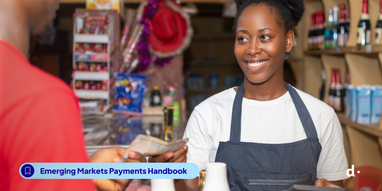How emerging markets are becoming the new engine of global growth

Emerging markets are reshaping digital commerce. Mobile-first behaviors, rising cities, and local payment trends are redefining where and how the world transacts
Quick summary
- Emerging markets are projected to generate 65% of global growth by 2035
- These regions house the world’s youngest, most connected digital consumers
- Domestic rails and mobile-native payment flows are shaping eCommerce
- Checkout is no longer just backend—it’s a trust moment and a product experience
- This blog kicks off a series exploring trends from dLocal’s Emerging Markets Payments Handbook 2025
More people, more mobile, more digital
Where future customers are coming online, they’re often skipping legacy rails and embracing app-based financial lives shaped by mobile devices, not by preference, but because of how infrastructure has evolved.
This is the reality across much of Africa & the Middle East, Asia, and Latin America, regions reshaping how and where global business happens.
By 2035, emerging markets are expected to generate two-thirds of global economic growth. But it’s not just about GDP, it’s about the people driving this growth.
Nearly 90% of the world’s Gen Z and Millennials will live in these markets by the end of the next decade. And they’re not just young and digital-first, they’re increasingly part of a rising middle class that’s set to double by 2030, bringing billions more into the digital economy. As they move into cities—many into fast-growing mid-sized hubs—they’re shaping new patterns of consumption, connection, and commerce.
Meeting them means understanding their daily realities—how they manage money, make choices, and define value. As internet access deepens and local tech ecosystems grow, these markets are shaping demand, defining product expectations, and driving the next era of global transformation.
“The most important growth story in global commerce isn’t unfolding in traditional centers. It’s taking shape in the dynamic, fast-growing economies of the Global South.” — Pedro Arnt, CEO of dLocal
Behavior leads, systems adapt
That shift is also visible in how people pay. Emerging market users aren’t waiting for perfect infrastructure; they’re already transacting online, often ahead of regulation or formal systems. Behavior moves first, and rails are forced to keep up.
Across markets, a few patterns stand out:
- Mobile access via prepaid plans or shared devices
- Informal income streams increasingly moving into digital channels
- Widespread use of QR codes, SuperApps, and link-based payments
- Strong demand for control, transparency, and checkout familiarity over convenience
People pay the way they live—and that makes local and alternative payment methods (APMs) less of a feature and more of a baseline.
Infrastructure is connecting, but behavior stays local
As user behavior pushes ahead, infrastructure is playing catch-up. In response, regulators across emerging markets are working to formalize and connect fragmented systems.
Countries like Nigeria are advancing open banking to unify providers. Southeast Asia is moving toward standardized QR acceptance. And Latin America is piloting regional real-time rails for faster cross-border flows.
But even as these top-down initiatives grow, payment habits remain rooted in local context:
- In markets like the Philippines, Egypt, and Kenya, local tools like GCash, Fawry, and M-PESA are defaults
- In Colombia, Pakistan, and Mexico, PSE, Easypaisa, and SPEI are allowing millions to pay online for basic services and products every day
Many users might have never set foot in a bank branch. They expect payments to be intuitive, immediate, and recognizable because trust is built at the point of use, not through system design.

A new center of gravity for global business
What’s unfolding across emerging markets isn’t just a change in consumer behavior, but rather a realignment of global opportunity. These regions are setting new benchmarks for business growth, innovation, and demand. As urban populations grow and internet access widens, home-grown startups are solving local challenges with solutions that often move faster than legacy models.
From tech hubs in Nairobi and Sao Paulo to innovation corridors in Vietnam and Saudi Arabia, both local entrepreneurs and global companies are rethinking where product roadmaps take shape. Emerging markets are now shaping how global products are built and sold.
Industries shaping emerging market momentum
At the same time, entire industries are adapting to meet them where they are. In many cases, they’re not just responding to behavior, they’re shaping it.
- Streaming and digital subscriptions are thriving in Southeast Asia, LATAM, and the Middle East, fueled by mobile access, prepaid plans, and localized pricing
- Ride-hailing and delivery apps are filling critical infrastructure gaps, offering reliable options in places where public transport is limited or trust is low
- In retail, social sellers and small businesses are growing online without opening physical stores
- In Africa and LATAM, eLearning platforms are creating new paths to pay for digital education
- Freelance and digital work is thriving as global platforms connect to skilled workforces in countries like Pakistan, the Philippines, or Kenya
- Travel and tourism are rebounding fast, with regional corridors shifting how people move and book
This reflects how people already live and points to emerging markets as the drivers of the next phase of digital commerce.
Key takeaways
- Emerging markets are not just growing fast, they’re growing differently
- Payment habits are shaped by mobile-first, infrastructure-light, trust-heavy behavior
- Understanding how users think, live, and transact is as important as what systems exist
- Local and alternative payment methods (APMs) are a signal of local relevance and functionality
- Growth follows relevance, and relevance starts at checkout
What’s next in this series
This is the first in a series of articles built on insights from dLocal’s Emerging Markets Payments Handbook 2025. We’ll be diving into payment trends, regional breakdowns across Africa & the Middle East, Asia and Latin America, cross-border expansion watchpoints for payment teams, and localization strategies by industry that drive retention and conversion
Get in touch with our payment experts
We help global companies such as Amazon, Spotify, and Microsoft find new opportunities in high-growth markets. Let's think outside the box for tailor-made payment solutions for your business. Fill out this form, and we'll get back to you as soon as possible.
Contact us




